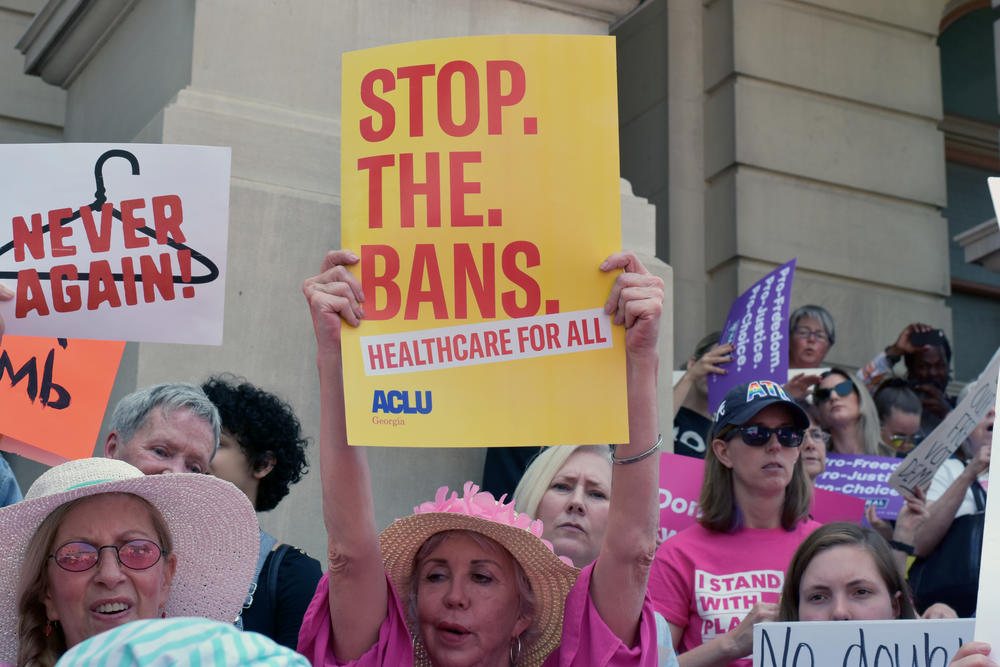Section Branding
Header Content
Looking Back At A Consequential 2019 In Georgia Politics
Primary Content
2019 has been a consequential year across Georgia’s political landscape, from the inauguration of a new governor to fierce debates over voting and reproductive rights to national attention over the state’s potential to flip from Republican to Democrat.
GPB political reporter Stephen Fowler sat down with All Things Considered host Rickey Bevington to recap some of the biggest moments.
Gov. Brian Kemp takes office
Kemp was sworn in as Georgia’s 83rd governor in January after a bruising election.
He won by a hair, beating Democrat Stacey Abrams by just 58,000 votes, causing some alarm among Republicans who have held power in a reliably conservative state.
The Republican from Athens introduced himself to the state by acknowledging he was taking over a fractured electorate.
“Through the prism of politics, our state appears divided: metro versus rural, black versus white, Republican versus Democrat,” he said. “Elections can simply rip us apart.”
But, Kemp said he will fight for all Georgians, not just the ones that voted for him. Overall, he has made progress on many campaign promises, but faces an uphill battle next year with the legislature after asking state agencies for sweeping budget cuts.
RELATED STORIES:
- The Sounds Of Brian Kemp's First Day As Governor
- Kemp Says He's Delivered On Promises During First 100 Days
- Gov. Kemp Outlines Plan To Lift Up Rural Georgia, Streamline State Budget
Georgia’s ‘heartbeat’ abortion law signed
One of the biggest flashpoints this year came when Georgia joined several other states in passing tighter restrictions on abortion – restrictions that have also been blocked by the courts.
The so-called “heartbeat” bill in Georgia would outlaw most abortions after fetal cardiac activity is detected, around six weeks into pregnancy and before many women might know they are pregnant. The law also grants certain economic and legal rights to an embryo.
A federal judge temporarily stopped the law from taking effect while a larger court case is heard.
Some conservative groups say the legal challenge is by design, so abortion rights opponents can ultimately get the U.S. Supreme Court to hear a case that could weaken or strike down the landmark Roe vs. Wade decision setting current federal precedent on abortions.
Candidates on both sides of the aisle have indicated this bill will be a major focus of their campaigns for state legislature seats in 2020.
RELATED STORIES:
- How Georgia's 'Heartbeat' Abortion Bill Is Aimed At The Supreme Court
- Georgia District Attorneys Divided On Meaning Of New Abortion Law
- Judge Says Georgia's Abortion Law Cannot Take Effect While Legal Challenge Is Pending
Georgia updates its voting machines as groups challenge election administration
Another big political story this year has revolved around voting: the state is currently doing the largest-ever rollout of new voting machines, and this comes as two big lawsuits are challenging Georgia elections.
The secretary of state’s office is fighting a tight timeline to deliver more than 30,000 new touchscreen ballot-marking devices by the March 24, 2020, presidential primary.
A pair of lawsuits have seen some success in changing how Georgia runs its elections. One seeks to ban electronic voting in Georgia and has resulted in a judge ordering officials to ditch the current 17-year-old machines after 2019.
The other is challenging various election laws and practices that allegedly disenfranchise voters, including a so-called “use-it-or-lose-it” law that allows the state to remove inactive voter registrations from the rolls after several years of not voting or responding to elections officials.
Just last week, Secretary of State Brad Raffensperger’s office canceled 309,000 inactive registrations but reinstated more than 22,000 to the inactive list after court filings from Fair Fight Action showed an error with the state’s purge process.
And more than 450,000 new voter registrations have been processed since the November 2018 gubernatorial election.
RELATED STORIES:
- Secretary Of State Raffensperger: 'I Want To Get The Election Process Right'
- Judge Orders Paper-Based Georgia Elections For 2020 Onward
-
New Voting Machines On Display At Georgia National Fair
The end of an era as Sen. Johnny Isakson resigns
Republican Sen. Johnny Isakson shocked the state when he announced he would step down at the end of the year, citing health concerns.
His retirement represents the end of an era in Georgia, and his farewell address on the Senate floor likely marked the end of any hints of bipartisan conversation until after 2020.
"I'm big, big, big on bipartisanship whether you're black or white, Republican or Democrat, whatever it might be,” Isakson said. “Find a way, find common ground, give it a chance to work and if it doesn't, you're a future friend.”
Kemp recently appointed Atlanta businesswoman Kelly Loeffler to fill Isakson’s Senate seat for about 10 months until a special election takes place. Loeffler is a politically unknown megadonor who might have to face challenges from both Democrats and Republicans in next year’s contest.
RELATED STORIES:



